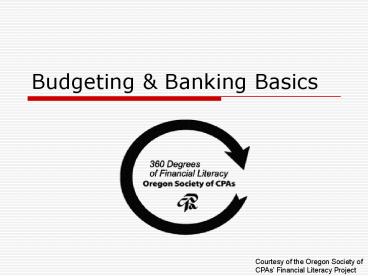Budgeting PowerPoint PPT Presentation
1 / 16
Title: Budgeting
1
Budgeting Banking Basics
Courtesy of the Oregon Society of CPAs Financial
Literacy Project
2
Anyone can save money
- Saving a small amount of money each day adds up
to large amounts of money later. - People with high incomes go bankrupt and people
with low incomes retire with security.
Courtesy of the Oregon Society of CPAs Financial
Literacy Project
3
What can happen each month.
Courtesy of the Oregon Society of CPAs Financial
Literacy Project
4
Establishing a budgetwhat are your financial
goals?
- First, make a list of your short-term goals
(e.g., new car, vacation) - Then list long-term goals (e.g., your child's
college education, retirement). - Decide how important it is for you to
- achieve this goal. How much will you need to
save?
Courtesy of the Oregon Society of CPAs Financial
Literacy Project
5
Establishing a budgetadd up your income
- Regular salary and wages
- Any other types of income, such as
- -dividends
- -interest
- -child support
Courtesy of the Oregon Society of CPAs Financial
Literacy Project
6
Establishing a budgetadd up your expenses
- Divide expenses into 2 categories
- fixed (e.g., housing, food, clothing,
transportation) - discretionary (e.g., entertainment, vacations,
hobbies) - Include out-of-pattern expenses (holiday gifts,
car maintenance, home repair, etc.) - Look through canceled checks, credit card bills,
and other receipts from the past year to see if
youre forgetting any kinds of expenses. - Whenever possible, include your financial goals
as expenses.
Courtesy of the Oregon Society of CPAs Financial
Literacy Project
7
Tips for sticking to a budget
- Involve the whole family Agree on a budget up
front and meet regularly to check your progress. - Stay disciplined Try to make budgeting a part of
your daily routine. - Start your new budget at a time when it will be
easy to follow and stick with the plan (e.g., the
beginning of the year, as opposed to right before
the holidays). - Avoid using credit cards to pay for everyday
expenses It may seem like you're spending less,
but your credit card debt will continue to
increase.
Courtesy of the Oregon Society of CPAs Financial
Literacy Project
8
Once youre in credit card debt, its hard to get
out.
Average household debt 9,300 Average interest
rate 13.4 ABC News, 2006
Courtesy of the Oregon Society of CPAs Financial
Literacy Project
9
After 3 yearspaying the minimum balance
Assuming 13 interest rate
Courtesy of the Oregon Society of CPAs Financial
Literacy Project
10
After 32 and a half years??
- At this rate it would take 32.5 years to pay off
your credit card balance - (assuming no additional charges or debts)
- If you are 35 now, you would be over 67 years
old. - Total payment on that 9,300
- 19,923!!
Courtesy of the Oregon Society of CPAs Financial
Literacy Project
11
More tips for sticking to a budget
- Build rewards into your budget (e.g., eat out
every other week). - Decide which things expenses are "wants" (e.g.,
designer shoes) and which are "needs" (e.g.,
groceries). - Move next to the wants how many can you reduce,
even by a little?
Courtesy of the Oregon Society of CPAs Financial
Literacy Project
12
Save small amounts, invest it, and watch it grow.
Courtesy of the Oregon Society of CPAs Financial
Literacy Project
13
Save small amounts, invest it, and watch it grow.
Courtesy of the Oregon Society of CPAs Financial
Literacy Project
14
Save small amounts, invest it, and watch it grow.
Courtesy of the Oregon Society of CPAs Financial
Literacy Project
15
Other ways to save
- Banks offer direct deposit designate a certain
amount of to a savings account. - If youve paid something off, keep putting the
amount of that payment into a savings account. - What do you do with raises? You dont have to
save all, but save some.
Courtesy of the Oregon Society of CPAs Financial
Literacy Project
16
For more informationon Financial Literacy
- Contact the Oregon Society of CPAs
- www.orcpa.org/FL_presentations.html
- 503-641-7200 / 1-800-255-1470,
- ext. 12 cwright_at_orcpa.org
Courtesy of the Oregon Society of CPAs Financial
Literacy Project

